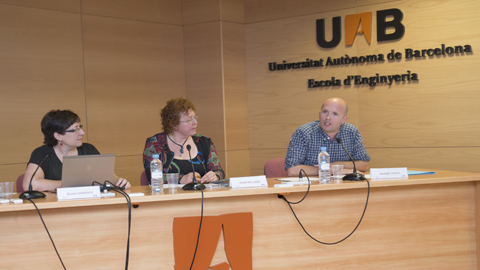International workshop to strengthen ties between gender and research

11/07/2014
The workshop opened with short speeches by the vice rectors of the UAB Pilar Dellunde and Sílvia Carrasco, who is also the UAB's representative for the EGERA Project, and Maxime Forest, scientific coordinator of the EGERA Project. "We highlight the need to introduce the perspective of gender in research, since this would be a sign of excellence in research", Maxime Forest stated in her speech.
Following her, Professor Sharlene Hesse-Biber offered the inaugural conference entitled "Thinking Outside the Traditional Science/Knowledge Box: Applying Feminist Principles of Praxis to Enhance Credibility and Social Justice in Scientific Inquiry". In her conference, she spoke of the impact traditional scientific knowledge has on the life of women and excluded groups. She made special emphasis on the social injustices suffered by many women for the sole reason that their vision is not taken into account in many aspects of life. As an example, she detailed the construction of a road in rural Yemen, built by men engineers but used basically by women, and where there are many accidents because the road was not built taking into account their habits or point of reference.
Following her conference, Montserrat Rifà-Valls, the director of the Observatory for Equality, presented the report on "Mapping & Critical Assessment of Existing Tools for Including Gender in Research". "Conducting a more inclusive research not only means paying attention to the composition of the research teams in terms of number of men or women; it also refers to the issues that are researched, whether or not they affect women", explained researcher Montserrat Rifà.
The workshop is part of a four year European project entitled EGERA (Effective Gender Equality in Research and the Academia). It began in January 2014 with the objective of achieving gender equality in the academic world, strengthening the dimension of gender in research and working to analyse structural inequality indicators, to promote professional and educational environments which favour gender equality and to raise awareness amongst the community. Each participating university was assigned specific tasks. The UAB must find ways to introduce the perspective of gender into research and science. Its research team will be made up of Montserrat Rifà-Valls, Sílvia Carrasco, Maria Prat, Begonya Sáez, Georgeta Ion, Laura Duarte and Maribel Ponferrada.
In the afternoon session reserved for researchers, attendants discussed the tools provided by the European Committee to introduce the perspective of gender in the different phases of research. In this meeting, leading UAB groups from different scientific disciplines and with important international trajectories participated. Some of them included: The GEPOC group (GEPOC – Grup d’Estudi de Processos Oceànics i Climàtic) belonging to ICTA (Institute of Environmental Science and Technology), IBB (Institute of Biotechnology and Biomedicine), the HPC4EAS group (High Performance Computing for Efficient Applications and Simulations), the CORE in Mental Health, the Institute for Aging, the Comparative and Functional Genomics Group, the Department of Psychobiology, the Journalism Lab, the Antígona Research Group, the Centre for the Study of Prehistoric Archaeological Heritage (CEPAP), as well as experts on gender such as professors Teresa Paramio and Teresa Torns.
The University and Gender
In practically all universities, it is amongst the teaching staff in which the greatest differences between women and men can be seen. At the UAB, for example, women must support the "funnel" effect: the number of women decreases in comparison to their male counterparts the higher up they find themselves on the academic ladder.
Therefore, although the number of women graduating with a PhD has increased in the past seven years, approximately 9 points, production in public management and chairs has only increased by one point. The category which has had a greater increase in women lecturers is that of adjunct lecturer and tenure-track lecturer.
In the case of administration and services staff, the number of women at the UAB is relatively high, especially among civil servants. Nevertheless, there is a lower representation of women among the higher categories. Amongst students, women continue to be the majority in different areas of knowledge, except in the technologies sector. With regard to PhD programmes, there has been a growth in the percentage of women enrolled, and in recent years they have become the majority.
The UNESCO promotes the idea of an inclusive education, as a specification of the Declaration of Human Rights, and considers equality between men and women has been negatively affected by the current socio-economic crisis, a time in which the principle of equality continues to be fundamental. Although EU policies in gender and research go back a long way, truth is that little has been achieved. Experts emphasise the urgent need to implement organisation measures and that there is the need for a scientific culture in which gender and diversity is respected.